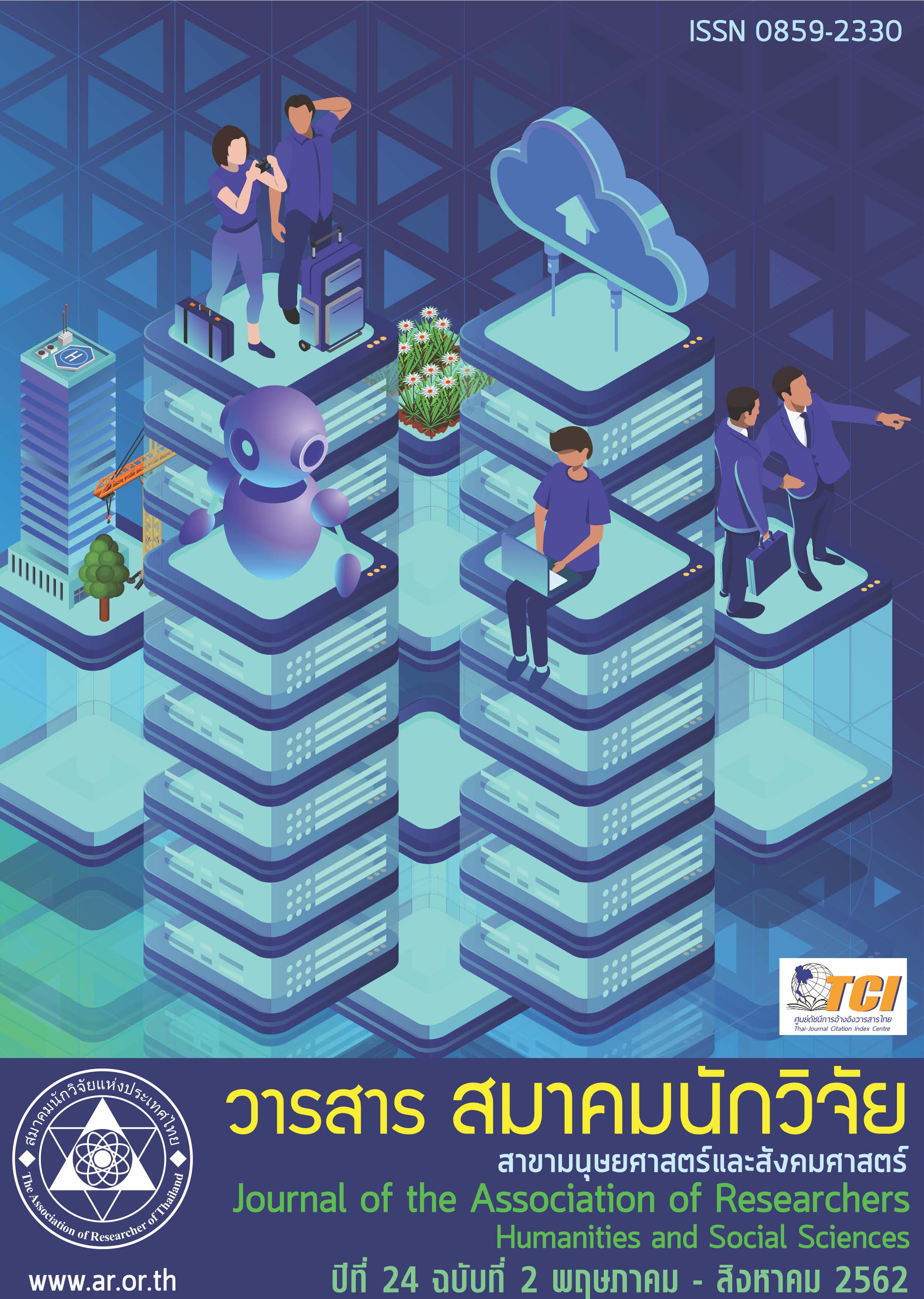Strategic Management Model of Demonstration School Autonomous University to Support Policy Thailand 4.0
Main Article Content
Abstract
The demonstration schools under government universities were established with special goals which are different from other general schools. Apart from aiming to serve as educational academic centers, they also have a duty to produce students with high capabilities for the country. In order to adjust themselves to be consistent with the government’s Thailand 4.0 policy, demonstration schools need to have a proper strategic management model. The objectives of this research were to: 1) analyze factors of strategic management for demonstration schools under government universities in response to the Thailand 4.0 policy; and 2) develop a strategic management model for these schools in response to the Thailand 4.0 policy. This research employed quantitative and qualitative research methods. For the quantitative research part, the sample consisted of 450 teachers from 25 university demonstration schools who were working in the academic year 2018. They were selected by stratified sampling. The sample size was determined based on 20 times the observed variables. Data were collected with the use of a questionnaire and analyzed with second order confirmatory factor analysis. For the qualitative research component, SWOT analysis was conducted with five executives from each of the 25 university demonstration schools, making a total number of 125 respondents. The SWOT analysis was performed with the aim to synthesize a strategic management model for these schools in response to the Thailand 4.0 policy. The research findings showed that: 1) the factors of strategic management of the university demonstration schools in response to the Thailand 4.0 policy conformed with the empirical data and consisted of 5 main aspects including direction determination, organizational and environmental evaluation, strategy determination, strategy implementation, and evaluation and control; and 2) a strategic management model for these schools in response to the Thailand 4.0 policy consisted of the establishment of a school vision that emphasized producing students to be leading innovators of the country, the development and the use of active learning, and the utilization of free management systems based on an identity of the school. These research findings can be used to develop a model and determine guidelines for the strategic management of the demonstration schools under government universities to respond efficiently to the government’s Thailand 4.0 policy.
Article Details
บทความที่ปรากฏในวารสารนี้ เป็นความรับผิดชอบของผู้เขียน ซึ่งสมาคมนักวิจัยไม่จำเป็นต้องเห็นด้วยเสมอไป การนำเสนอผลงานวิจัยและบทความในวารสารนี้ไปเผยแพร่สามารถกระทำได้ โดยระบุแหล่งอ้างอิงจาก "วารสารสมาคมนักวิจัย"
References
เกษม เมษินทรีย์. (2559). ยุทธศาสตร์และการปฏิรูปสู่การเป็นไทยแลนด์ 4.0.กรุงเทพฯ: กระทรวงศึกษาธิการ.
จินตนา บุญบงการ และ ณัฏฐพันธ์ เขจรนันท์. (2546). การจัดการเชิงกลยุทธ์. กรุงเทพฯ: ซีเอ็ดยูเคชั่น.
จรูญ วัฒนา. (2553). ร่วมกันสรรค์สร้างคุณภาพโรงเรียนสู่ความเป็นเลิศ. กรุงเทพฯ: สุวีริยสาส์น
ชนินทร เพ็ญสูตร (2560). ประเทศไทย 4.0 บริบททางเศรษฐกิจ และการเมือง. วารสารรัฐศาสตร์และรัฐประศาสนศาสตร์. 8 (1): 67-99.
ทิวัตถ์ ศรีดำรงค์. (2556).การบริหารสถานศึกษาสู่การเป็นโรงเรียนคุณภาพ: การศึกษาทฤษฎีฐานราก. อุดรธานี. ดุษฎีนิพนธ์ ปรัชญาดุษฎีบัณฑิต สาขาการบริหารการศึกษา: บัณฑิตวิทยาลัย มหาวิทยาลัยราชภัฏอุดรธานี
ธีระเกียรติ เจริญเศรษฐศิลป์. (2559). การศึกษาไทย 4.0 ในบริบทการจัดการศึกษาเพื่อการพัฒนาที่ยั่งยืน. กรุงเทพฯ: ศูนย์ ประชุมวายุภักษ์ โรงแรมเซ็นทราและคอนเวนชั่นเซ็นเตอร์ ศูนย์ราชการ แจ้งวัฒนะ.
นันทนา โมลีวงศ์. (2559).การพัฒนามาตรฐาน ตัวบ่งชี้ และเกณฑ์สำหรับการประกันคุณภาพภายในของโรงเรียนสาธิต สังกัดมหาวิทยาลัยศรีนครินทรวิโรฒ.กรุงเทพฯ. ปริญญานิพนธ์ ปริญญาการศึกษามหาบัณฑิต สาขาวิชาการวิจัย และพัฒนาศักยภาพมนุษย์. บัณฑิตวิทยาลัย มหาวิทยาลัยศรีนครินทรวิโรฒ
นคร ตังคะพิภพ (2553). รูปแบบสถานศึกษานำเสนอต่อคณะทำงานปฏิรูปการศึกษาเพื่อสุขภาวะคนไทย วันที่ 5 กุมภาพันธ์ 2553. (เอกสารอัดสำเนา) กรุงเทพฯ: คณะทำงานปฏิรูปการศึกษาเพื่อสุขภาวะคนไทย
ปัญญา แก้วกียูร (2545). การบริหารจัดการศึกษาในรูปแบบการใช้โรงเรียนหรือเขตพื้นท่ีการศึกษาเป็นฐาน. กรุงเทพฯ : สำนักงานปฏิรูปการศึกษา.
ไพฑูรย์ สินลารัตน์. (2536). โรงเรียนสาธิต: จุดมุ่งหมาย บทบาท และทิศทาง. กรุงเทพฯ: คณะคุรุศาสตร์ จุฬาลงกรณ์ มหาวิทยาลัย.
พิมลพรรณ ดุษิยามี. (2550). การบริหารเชิงกลยุทธ์ของผู้บริหารสถานศึกษาเอกชน. กรุงเทพฯ.วิทยานิพนธ์การศึกษามหา บัณฑิต สาขาการบริหารการศึกษา. บัณฑิตวิทยาลัย มหาวิทยาลัยศิลปากร.
Chandle,Jr.,A. D.(2010).Strategy and Structure. Cambridge, Mass: The M.I.T.Pess.
Certo, S.C & Peter, J.P. (2011). Strategic Management: Concepts and Cases, 2nd ed. New York: McGrawHill.
Glueck W.F. & Lawrence R.J. (2010). Business Policy and Strategic. New York: McGraw –Hill.
Hersey, P., Blanchard, K.H. & Johnson, D.E. (1996). Management of Organizational Behavior: Utilizing Human Resource. Upper Saddle River, NJ.: Prentice-Hill.
Hitt, M.A., Ireland, R.D., & Hoskisson, R.E. (2010). Strategic Management: Concepts & Cases Competitiveness And Globalization. Wall Street Journal (8th ed.). Canada: South-Western.
Keeves, P. J. (1988). Educational Research Methodology, and Measurement: An International Handbook. Oxford, England: Pergamon Press.
Kumar, M., Kee, F. T. & Manshor, A. T. (2009). Determining the Relative Rmportance of Critical Factors in Delivering Service Quality of Banks; An Application of Dominance Analysis in SERVQUAL Model. Managing Service Quality. 19 (2): 211-228.
Michel, R. (2013). Strategic Management Formulation, Implementation, and Control in a Dynamic Environment. New York: Haworth Press.
Quinn,J. (2010) Learning Communities and Imagined Social Capital: Learning to Belong. New York and London: Continuum.
Thompson, A. A & Strickland lll, A.J.(1999). Strategic Management. Concept and Cases, Boston : McGrawHill.
Tan KC, Shen, XX (2000). Integrating Kano’s Model in the Planning Matrix of Quality Function Deployment. Total Qual. Manage. 11(8): 1141 - 1151.
Translated Thai Reference
Ministry of Industry (2016). Thai Industrial Development Strategy 4.0. Bangkok: Ministry of industry.
Mesinaree Kasem. (2016). Strategies and Reforms to Become Thailand 4.0. Bangkok: Ministry of Education.
Boonbongkarn Chintana and Khemkunnant Natthapan. (2003). Strategic Management. Bangkok: SE-EDUCATION.
Wattana Jaroon. (2010). Together to Create Quality Schools for Excellence. Bangkok: Suwiriyasan.
Pensute Chanintorn (2560). Thailand 4.0 Economic and Political Context. Journal of Political Science and State Theology. 8 (1): 67-99.
Sridamrong Tiwat. (2013). School Administration to Become a Quality School: Theory Study Foundation. Udon Thani. Dissertation (Educational Administration):Graduate School Udon Thani Rajabhat University
Charoensethasil Thirakiat. (2016). Thai Education 4.0 in the Context of Educational Management For Sustainable Development. Bangkok: Vayupak Convention Center Centra Hotel and Convention Center Chaengwattana Government Center.
Mollywong Nanthana. (2016). Development of Indicators and Criteria for Internal Quality Assurance of Demonstration Schools Under the Jurisdiction of Srinakharinwirot University. Thesis (Research and development of human potential): Graduate School Srinakharinwirot University
Tangkapaphop Nakorn (2010). Educational Institution Model Presented to the Education Reform Working Group for Health Thai People. February 5, 2010. (Copied Documents) Bangkok: Education Reform Working Group for Thai People.
Kaewkeeyur Panya (2002). Educational Management in the Form of School Use or Educational Area as a Base. Bangkok: Office of Education Reform.
Sinlarat Paitoon. (1993). Demonstration School: Purpose, Role and Direction. Bangkok: Faculty of Education, Chulalongkorn University.
Dusiyamee Pimolphan (2007). Strategic Management of Private School Administrators. Bangkok: Thesis (Educational Administration) Graduate School Silpakorn University.


